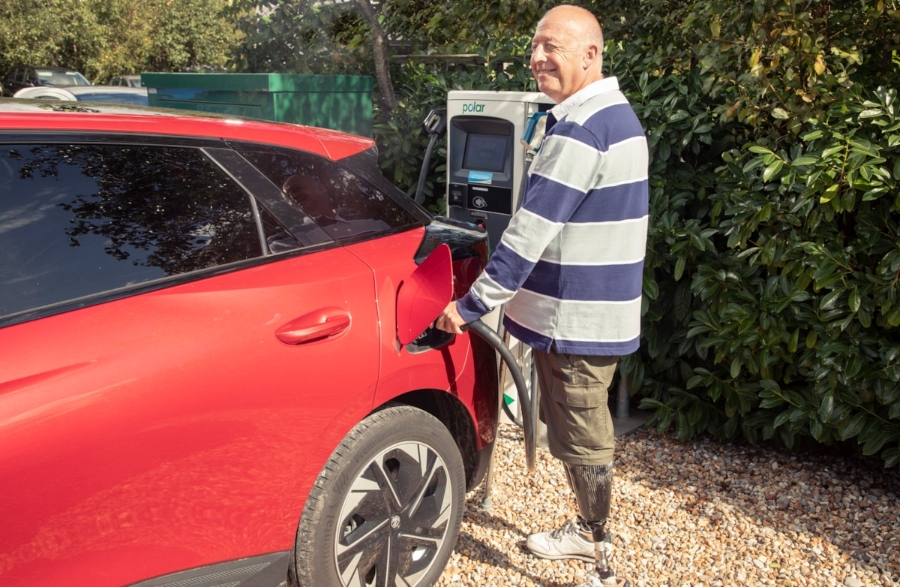Motability Operations has launched its EV Transition Tracker. Findings from the Tracker reveal challenges for the UK’s transition to electric vehicles, as many disabled people struggle with the public charging network.
Almost half of the UK public say they will not choose an electric vehicle until there is no other option, according to the new EV Transition Tracker.
The findings, including a survey of disabled drivers that are part of the Motability Scheme’s Headlight Community, suggest that the hesitancy to switch to an EV is even greater for disabled customers, with 65 percent stating they will not make the shift until they have no choice.
This reluctance to move to electric comes despite relatively positive perceptions of EVs. According to the findings, two in five people have a positive opinion of EVs, behind petrol and hybrid vehicles but ahead of diesel vehicles at 33 percent.
However, issues with the public charging network are presenting a major roadblock. Of those who would not consider buying an EV for their next vehicle, 45 percent pointed to a lack of options for public charging where they live or travel, while 46 percent cited not being able to charge at home, following concerns about range at 55 percent and purchase cost at 55 percent.
Data from Motability Scheme customers revealed even greater challenges for disabled people when using the public network. 44 percent said they find it difficult to locate their nearest charging point, while a further 60 percent agreed that charge points are often unavailable and in use by others.
A community of over 1,000 disabled people on the Motability Scheme took part in a test programme reviewing UK chargepoints and uncovering vital information such as their reliability and accessibility. Of the 6,800 reviews submitted, many point to significant issues for disabled people, including bay size and space for wheelchair users; weight of the charging cables; hard-to-follow instructions; and facilities being too far away for disabled people to access.
Andrew Miller, CEO at Motability Operations, said: “The transition to EV presents a significant challenge – ensuring disabled people are not left behind as manufacturers move to produce electric models.
“From working with our customers every day, we know that many face significant issues with the shift, particularly with the public network. Not knowing whether charge points will be easy to find or meet their accessibility needs is preventing many from switching. This has the potential to lead to cliff edge transition that leaves thousands of people behind.”
Among drivers who are unsure or not currently considering an EV, a third of UK respondents and six in 10 disabled customers agree they would consider moving to an EV if there was better public charging. Motability Operations is therefore urging charging operators and policymakers to ensure accessibility is built into the design of public infrastructure and to increase the roll-out at pace.
Nigel Fletcher, CEO of the Motability Foundation, added: “There is a risk of disabled people being left behind in the rollout of public chargepoints – an issue that the Motability Foundation has been raising for a number of years. We estimate that up to half of disabled motorists –1.3 million disabled motorists – will be reliant on public EV chargepoints by 2035.
“The BSI PAS 1899 standard, which we co-sponsored alongside UK Government, was published in October 2022, and provides a clear specification on the minimum requirements to improve public chargepoint accessibility.
“A review of the PAS 1899 standard has also taken place, which provided an opportunity for industry to give feedback on achieving PAS 1899 compliance and engage with disabled people on their experiences with public charging. Taking on board evidence received during the review an updated version of PAS 1899 is likely to be available early next year.
“It has been the Motability Foundation’s position for some time that the PAS 1899 standard should be made mandatory by law. Providers of public charging should also be taking responsibility for ensuring their infrastructure is accessible.”
The EV Transition Tracker report can be accessed on the Motability website.
Motability Operations recently unveiled a pioneering passenger wheelchair-accessible electric demonstrator car to encourage car manufacturers to seize an opportunity to ensure that the transition to electric vehicles does not leave behind wheelchair users.
The post Report suggests 65 percent of disabled drivers are hesitant to switch to an electric vehicle appeared first on AT Today – Assistive Technology.

